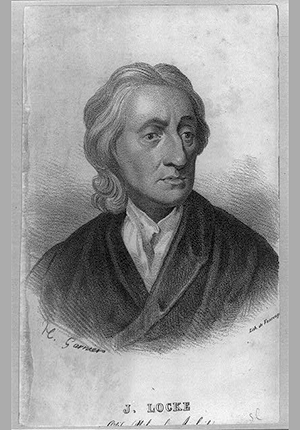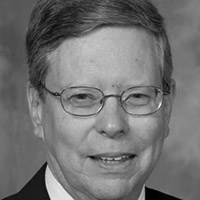Historic Document
An Essay Concerning Human Understanding (1690)
John Locke | 1690

Library of Congress, Prints and Photographs Divison
Summary
John Locke (1632-1704) was the author of A Letter Concerning Toleration (1689), An Essay concerning Human Understanding (1690), Two Treatises on Government (1690), and other works. Prior to the American Revolution, Locke was best known in America for his epistemological work. Contrary to the Cartesian view of innate ideas, Locke claimed that the human mind is a tabula rasa and that knowledge is accessible to us through sense perception and experience. Of the significance of Locke’s contribution to the theory of knowledge, James Madison compared him to Sir Isaac Newton’s discoveries in natural science: Both established “immortal systems, the one [Newton] in matter, the other [Locke] in mind” ("Spirit of Governments," 1791).
Selected by

Paul Rahe
Professor of History and Charles O. Lee and Louise K. Lee Chair in the Western Heritage at Hillsdale College

Jeffrey Rosen
President and CEO, National Constitution Center

Colleen A. Sheehan
Professor of Politics at the Arizona State University School of Civic and Economic Thought and Leadership
Document Excerpt
BOOK I.
CHAP. II.: No Innate Principles in the Mind.
The way shewn how we come by any knowledge, sufficient to prove it not innate.
§ 1. It is an established opinion amongst some men, that there are in the understanding certain innate principles; some primary notions, ϰοιναὶ ἔννοιαι, characters, as it were, stamped upon the mind of man, which the soul receives in its very first being; and brings into the world with it. It would be sufficient to convince unprejudiced readers of the falseness of this supposition, if I should only shew (as I hope I shall in the following parts of this discourse) how men, barely by the use of their natural faculties, may attain to all the knowledge they have, without the help of any innate impressions; and may arrive at certainty, without any such original notions or principles. For I imagine any one will easily grant, that it would be impertinent to suppose, the ideas of colours innate in a creature, to whom God hath given sight, and a power to receive them by the eyes, from external objects: and no less unreasonable would it be to attribute several truths to the impressions of nature, and innate characters, when we may observe in ourselves faculties, fit to attain as easy and certain knowledge of them, as if they were originally imprinted on the mind. . . .
BOOK II.
CHAP. I: Of Idea in general, and their Original.
§ 2. Let us then suppose the mind to be, as we say, white paper, void of all characters, without any ideas: —How comes it to be furnished? Whence comes it by that vast store which the busy and boundless fancy of man has painted on it with an almost endless variety? Whence has it all the materials of reason and knowledge? To this I answer, in one word, from EXPERIENCE. In that all our knowledge is founded, and from that it ultimately derives itself. Our observation employed either, about external sensible objects, or about the internal operations of our minds perceived and reflected on by ourselves, is that which supplies our understandings with all the materials of thinking. These two are the fountains of knowledge, from whence all the ideas we have, do spring. . . .
CHAP. XI.: Of Discerning, and other Operations of the Mind.
§ 17. I pretend not to teach, but to inquire, and therefore cannot but confess here again, that external and internal sensation are the only passages that I can find of knowledge to the understanding. These alone, as far as I can discover, are the windows by which light is let into this dark room: for methinks the understanding is not much unlike a closet wholly shut from light, with only some little opening left, to let in external visible resemblances, or ideas of things without: would the pictures coming into such a dark room but stay there, and lie so orderly as to be found upon occasion, it would very much resemble the understanding of a man, in reference to all objects of sight, and the ideas of them. . . .
CHAP. XXI.: Of Power.
§ 51. As therefore the highest perfection of intellectual nature lies in a careful and constant pursuit of true and solid happiness, so the care of ourselves, that we mistake not imaginary for real happiness, is the necessary foundation of our liberty. The stronger ties we have to an unalterable pursuit of happiness in general, which is our greatest good, and which, as such, our desires always follow, the more are we free from any necessary determination of our will to any particular action, and from a necessary compliance with our desire, set upon any particular, and then appearing preferable good, till we have duly examined, whether it has a tendency to, or be inconsistent with our real happiness: and therefore till we are as much informed upon this inquiry, as the weight of the matter, and the nature of the case demands; we are, by the necessity of preferring and pursuing true happiness as our greatest good, obliged to suspend the satisfaction of our desires in particular cases.
§ 52. This is the hinge on which turns the liberty of intellectual beings, in their constant endeavours after and a steady prosecution of true felicity, that they can suspend this prosecution in particular cases, till they have looked before them, and informed themselves whether that particular thing, which is then proposed or desired, lie in the way to their main end, and make a real part of that which is their greatest good: for the inclination and tendency of their nature to happiness is an obligation and motive to them, to take care not to mistake or miss it; and so necessarily puts them upon caution, deliberation, and wariness, in the direction of their particular actions, which are the means to obtain it. Whatever necessity determines to the pursuit of real bliss, the same necessity with the same force establishes suspense, deliberation, and scrutiny of each successive desire, whether the satisfaction of it does not interfere with our true happiness, and mislead us from it. This, as seems to me, is the great privilege of finite intellectual beings; and I desire it may be well considered, whether the great inlet and exercise of all the liberty men have, are capable of, or can be useful to them, and that whereon depends the turn of their actions, does not lie in this, that they can suspend their desires, and stop them from determining their wills to any action, till they have duly and fairly examined the good and evil of it, as far forth as the weight of the thing requires.
BOOK IV.
§ 2. . . . Sense and intuition reach but a very little way. The greatest part of our knowledge depends upon deductions and intermediate ideas: and in those cases, where we are fain to substitute assent instead of knowledge, and take propositions for true, without being certain they are so, we have need to find out, examine, and compare the grounds of their probability. In both these cases, the faculty which finds out the means, and rightly applies them to discover certainty in the one, and probability in the other, is that which we call reason. For as reason perceives the necessary and indubitable connexion of all the ideas or proofs one to another, in each step of any demonstration that produces knowledge: so it likewise perceives the probable connexion of all the ideas or proofs one to another, in every step of a discourse, to which it will think assent due. This is the lowest degree of that which can be truly called reason. . . .
§ 23. By what has been before said of reason, we may be able to make some guess at the distinction of things, into those that are according to, above, and contrary to reason. 1. According to reason are such propositions, whose truth we can discover by examining and tracing those ideas we have from sensation and reflection; and by natural deduction find to be true or probable. 2. Above reason are such propositions, whose truth or probability we cannot by reason derive from those principles. 3. Contrary to reason are such propositions, as are inconsistent with, or irreconcileable to, our clear and distinct ideas. Thus the existence of one God is according to reason; the existence of more than one God, contrary to reason; the resurrection of the dead, above reason. . . .




